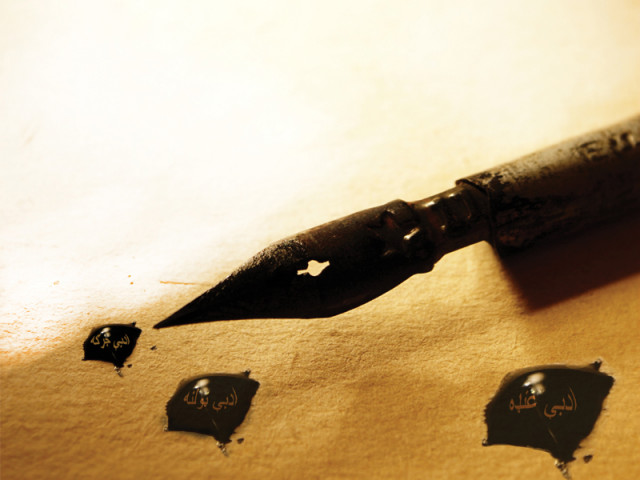Persevering on: Literary societies give life support to Pashto literature
Over 500 associations working for the promotion of art and literature in K-P and tribal areas.

Over 500 associations working for the promotion of art and literature in K-P and tribal areas. DESIGN: ESSA MALIK
Years of conflict have disintegrated Pukhtun culture, but small literary societies continue to put up a brave stand and keep Pashto literature alive.
According to the Pashto Academy of the University of Peshawar, more than 500 registered literary associations are working for the promotion of arts and Pashto literature at the grassroot level in Khyber-Pakhtunkhwa (K-P) and the tribal areas.
Known by different names such as Adabi Tolana, Adabi Ghunda or Adabi Jirga, these societies exist in almost all parts of the province and the Federally Administered Tribal Areas (Fata). Monthly meetings are held in hujras or at the shrines of legendary poets and the sessions are open for all to participate and present their work.

Literary societies are usually named after famous poets such as Rehman Baba Adabi Tolana, Fida Mutahir Adabi Tolana, Hameed Baba Adabi Tolana, Burq Adabi Tolna and Mian Umer Baba Adabi Tolna. Some are even named after the area they are based in such as Daudzai Adabi Tolna and Sokano Adabi Tolna.
“The near decade-long militancy has resulted in the decline of poetry sessions, literary and cultural events in the city. This has adversely affected Pashto literature and poetry,” Rehmat Shah, a poet, told The Express Tribune. “But it is these small groups which have kept Pashto literature alive over the last few years,” he said. The government has paid little attention to art and literature while cultural programmes are no longer held because of the deterioration security situation.
Several literary societies publish their own monthlies, help poets and writers publish their work, observe anniversaries of legendary poets and hold poetry sessions known as Aman (peace) Mushairas.
“In a province where Pashto is not the medium of education, these societies work towards the survival of both literature and language and have produced many
intellectuals,” said Dr Ali Muhammad Khan Afridi, a literary society member.
Talking about some notable scholars produced by these literary societies, Afridi said Saadullah Jan Burq, who is associated with Burq Pakhtu Adabi Tolana, has written a dozen books on Pashto literature and poetry. Niamatullah Khalil of Shama Adabi Tolna has written a book on Fida Mutahir, a famous Pashto poet, while writer Professor Aseer Mangal of Pakhtunkhwa Adabi o Kaltori Tolna has also made valuable contributions.
Afridi said in the past 20 years the number of societies has increased in both the province and the tribal areas. “Literary societies provide a platform for budding poets to get their voices heard. It also paves a way to be recognised on the regional and national level,” said Afridi.
Even though Pashto books are valuable and considered to be a “jewel of writing,” artists consider such societies as a more potent form of expression, maintained Afridi.
“Even if you spend years on researching and writing a book, people will not purchase it. You have to give it as a gift for someone to read it,” he added. “Wherever there are Pukhtuns there will be literary societies. They even exist in Dubai to represent the large number of Pukhtuns in the UAE.”
Published in The Express Tribune, October 3rd, 2013.













COMMENTS
Comments are moderated and generally will be posted if they are on-topic and not abusive.
For more information, please see our Comments FAQ